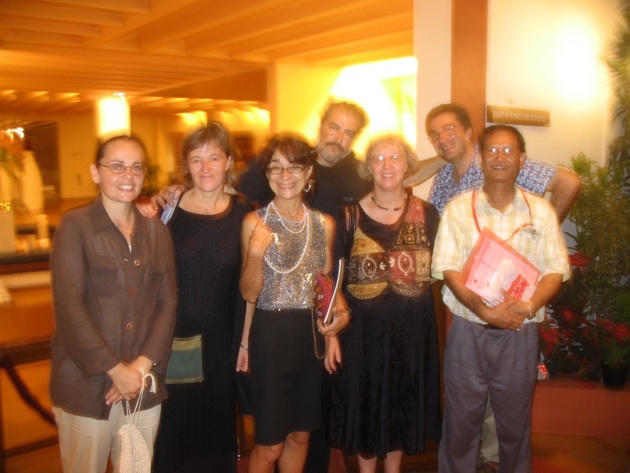n[ever]land :: digital paths
special guest at
37th IFFI - International Film Festival of India-2006
to be held at Goa
from November 23 to December 3, 2006
The 37th International Film Festival of India was held from November 23 – December 3 2006 in Goa.[1][2][3] The jury, headed by Australian director Rolf de Heer, consisted of French director Olivier Assayas, Polish actress Grażyna Szapołowska, Argentinian actress Leticia Bredice and India's Jahnu Barua.
The Technical Retrospective was instituted this year, which will cover topics on Digital Editing including a film ‘Cutting Edge’ followed by a Presentation by Editor Steven Cohen, while special Presentations on Film Restoration and Digital Animation were made by the technicians from Italy (by NEVERLAND digital paths).
The festival paid Homage to 11 Indian film personalities. These include Nadira, Actress, Naushad Ali, Music Director, Oduvil Unnikrishnan, Actor, Malayalam Cinema, P. Bhanumathi, Actress, Dancer, Director, Writer, Telugu and Tamil Cinema, Padmini, Actress, Hrishikesh Mukherjee, Dr. Rajkumar, renowned Kannada Actor, Srividya, Tamil/Malayalam Actress, Ustad Bismillah Khan, Parveen Babi and young Punjabi Film Director and two times National Award winner, Manoj Punj.
A new section "NFDC Down The Ages" featuring 6 films including Gandhi and Jaane Bhi Do Yaaro celebrated the contributions of National Film Development Corporation.
Winners
Best Film: Golden Peacock Award: "The Old Barber" (Le Vieux Barbier)" by "Hasi Chaolu" (Chinese film)
Silver Peacock Award for the Most Promising Asian Director: "An Kung-Lee" for " A Short Life" (South Korean film)
Special Jury Award: Silver Peacock: "Nirontor" by "Abu Sayeed" (Bangladeshi film).
Special screenings
Opening film
Volver by Pedro Almodovar (Spanish film)
Closing film
Babel by Alejandro Gonzalez Inarritu (American film).
The first International film festival of India was held in Bombay as early as 1952. At the third festival in 1965, the first competitive one for India, the Paris based Federation Internationale des Associations de Producteurs de Films ( FIAPF ) gave official recognition to the Indian Festival putting it on par with those of Cannes, Berlin, Venice, Karlovy Vary and Moscow. Since the 9th IFFI in 1983, with the participation of 22 World Countries, the festival has become a major forum for Third World cinema.
At the 12th IFFI in 1989, the festival was declared non-competitive once again. Again at the 27th IFFI in 1996, the festival included the competitive section on alternative years for Asian Women directors only. It was further expanded at the 29th IFFI in 1998, and included the competitive section for Asian directors. The event takes place annually between 10 and 20 October every year and the 34th IFFI will be held in the year 2003. However, it was decided to have the festival permanently in Goa from 2004 onwards and the 35th IFFI was held in Goa between 29 November and 9 December 2004. 36th IFFI was conducted in Goa between 24 November and 4 December and the competition section further expanded for Asian/African/Latin American film directors.
n[ever]land :: digital paths
The main goal of the past four editions has been the search for a human side to a technology which is often perceived as cold and incomprehensible, as well as a reflection upon the unceasing development which has led to, and is still leading to an extraordinary revolution in every field of human production.
n[ever]land is thus an opportunity to investigate if and how digital technology today can meet modern visual arts as well as the more ancient performing arts, traditional publishing industry and the extremely dynamic on-line communication, searching for the harmonic balance which can exist between production demands and creative needs.
The first edition was structured in the main areas:
- Digital Archives where technology is investigated as related to the preservation and fruition of great historic and cultural patrimonies, from virtual recontruction of museums to the listing of complex forms of preservation of our culture;
- Digital Screens, where recent specific techniques and new frontiers of communication through images are dealt with;
- Digital Classrooms, where focus is on technologies as an aid to teaching and learning.
- Digital Stages : new technology and old tradition in performing arts.
Among the most important guests we would like to mention: Accademia Nazionale di Santa Cecilia, ARS Electronica from Linz, Studio Azzurro di Milano, Cinecittà Holding e Cinecittà Digital, Discoteca di Stato, Apple Italia, MACRO-Museo d’Arte Moderna di Roma, Teatro dell’Opera of Rome, Università La Sapienza of Rome, Università Roma Tre of Rome, Università Tor Vergata of Rome, Alexander Sokurov and Hermitage Bridge Studio from San Pietroburgo, Mike Figgis, Siggraph, Imagina, Festival di Clermont- Ferrand from France, Festival Arcipelago from Rome, Cannes a Roma and the Semaine de la Critique, MGM Digital Communication, Paramount Pictures, Biblioteca Teatrale del Burcardo, Future Film Festival of Bologna, Brooklyn Film Festival of New York, E-Magiciens-The European Gathering of Young Digital Creation, Visual Technologies Department - IBM of New York with Egyptian Cultural Heritage Web Project, TAFT–Academy of Figurative Theatre of Fredrikstad (Norvay), Digital Theatre Department from Aarhus Universiti (Denmark) and may others.
Long-term goal for n[ever]land would be to become a trademark for a ‘Casa di Pensiero’ ("home of thought") which can provide a recurrent opportunity for an updated reflection upon the relationship between the world of art and communication and the universe of technology.
Locations for the past editions:
Palazzo delle Esposizioni, MACRO – Museo d’Arte Contemporanea in Roma, Casa del Cinema di Roma.
Next edition: casa del Cinema, Rome (Italy), march 2007
Enzo Aronica artistic director
Programma NEVERLAND @ IFFI-Goa 2006:
CENTRO SPERIMENTALE DI CINEMATOGRAFIA








